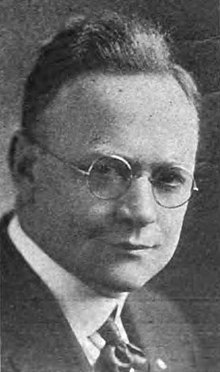William I. Traeger
| William I. Traeger | |
|---|---|

Traeger as Los Angeles County Sheriff in 1922.
|
|
| Member of the U.S. House of Representatives from California's 15th district |
|
|
In office March 4, 1933 – January 3, 1935 |
|
| Preceded by | None (New district) |
| Succeeded by | John M. Costello |
| Los Angeles County Sheriff | |
|
In office 1921–1932 |
|
| Preceded by | John C. Cline |
| Succeeded by | Eugene W. Biscailuz |
| Personal details | |
| Born |
February 26, 1880 Porterville, California |
| Died | January 20, 1935 (aged 54) Los Angeles, California |
| Alma mater | Stanford University |
 |
|
| Sport(s) | American football |
|---|---|
| Playing career | |
| 1897–1901 | Stanford |
| Position(s) | Tackle |
| Coaching career (HC unless noted) | |
| 1902 | Pomona |
| 1903 | Occidental (assistant) |
| 1906 | Los Angeles HS (CA) |
| 1908 | USC |
| Head coaching record | |
| Overall | 6–3–1 (college) |
William Isham Traeger (February 26, 1880 – January 20, 1935) was an American law enforcement official who served as sheriff of Los Angeles County from 1921 to 1932, and went on to serve one term as a United States Representative from California.
Traeger was born in Porterville, California, the oldest of five children of Augustus Traeger, a blacksmith who had migrated from Wisconsin in 1872, and his wife Martha Ellen (Dunn) Traeger, who had migrated from Arkansas in 1874. William attended elementary and high schools in Porterville, also assisting his father in his trade; Martha Traeger died in 1895. Traeger served during the Spanish–American War as a private and corporal in the 6th California Volunteer Infantry from May 11 to December 15, 1898.
After the war, he studied law at Stanford University, earning his undergraduate degree in 1901. While there, he starred as a tackle on the football team, kicking a field goal to give Stanford a 5–0 victory over California in the 1900 rivalry game (field goals counted for 5 points until 1904); he was captain of the team that played in the first Rose Bowl Game on January 1, 1902, a game in which he tore his shoulder ligament yet continued to play.
In 1902 he moved to Los Angeles, where he helped in various athletic departments, leading Pomona College's football team to a 3–2 record in 1902 and coaching at Occidental College the following year. He served as a deputy United States Marshal from April 1903 through 1906 and as a deputy sheriff for Los Angeles County from January 1907 to 1911.
...
Wikipedia
